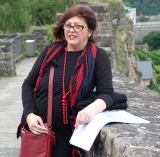Die eindringliche Stimme von Véronique Nosbaum und der farbenreichen Klavierpart seitens ihres Bruders Romain Nosbaum sind auf Albena Petrovics neuer CD The Voyager so unmittelbar aufeinander bezogen wie in einem intensiven Kammerspiel auf einer imaginären Theaterbühne. Egal ob Paul Verlaines impressionistische Lyrik oder auch mal eine persische Liebespoesie den Ausgangspunkt bildet – verblüffend gehen die Worte eine Symbiose mit Albena Petrovics komprimierter Klangsprache ein. Auch ihre im Jahr 2015 uraufgeführte Oper The Dark kommt - ins kammermusikalische Format übersetzt – mehrfach ins Spiel. Eine zentrale Figur ist die antike Eurydike, die im Königreich der Schatten lebt. Diese Frauenfigur aus der Antike ist eine Entwurzelte, eine Reisende. Das passt auch auf Albena Petrovic, eine tief blickende Komponistin, welche ihre bulgarische Heimat verließ, heute in Luxemburg eine neue Wahlheimat gefunden hat und deren musikalisches Schaffen immer wieder weitgespannte Reflexionsprozesse wiederspiegelt. An diesen ließ sie im Gespräch mit Stefan Pieper aufschlussreich teilhaben.

Albena Petrovic
(c) Stefan Pieper
Erzählen Sie mir etwas über die Historie dieses Projekts!
Ich freue mich, dass ich in den letzten fünf Jahren so viel Gelegenheit hatte, mich in vielen musikalischen Formen auszudrücken. Ich habe Lieder und Kammermusik komponiert – und last but not least sind vier Kammeropern entstanden. Jetzt wünsche ich mir, dass dieses ganze Schaffen noch mehr publik wird – vor allem beim internationalen Publikum. Nicht zuletzt deswegen habe ich mich entschieden, jetzt eine CD heraus zu bringen, die thematisch all dies umfasst. (Hier geht es zur zur Pizzicato-Rezension) Read More →
In today's music world pianist Javier Perianes has become, at the age of 40, the most renowned Spanish performer. His agenda runs naturally through the best stages and international festivals, where he performs in recitals as well as in concerts and tours with the most renowned orchestras and conductors. In recognition of such a successful career, he is Artist of the Year 2019 of the International Classical Music Awards (ICMA). We publish the English version of an interview made by Justo Romero for the Spanish ICMA Jury member Scherzo.

Javier Perianes
(c) Josep Molina
When more than two decades ago you were still a young and promising pianist, you denied harbouring the dream of becoming an acclaimed and recognized pianist. Now that the ‘no dream’ has come true, and so many things and successes have happened in your well-established concert career, do you still think the same way?
Yes, I maintain my answer of that time. My aim is to enjoy the music, each and every one of the projects that I have the opportunity to face, plus my family and my environment. Read More →
At the age of seventy-four, and after seventy years at the piano, Nelson Freire has won the Lifetime Achievement Award of the International Classical Music Awards, which he will receive at ICMA's Gala in Lucerne on 10 May. Child prodigy, endowed from his beginnings with an astonishing virtuosity, his trajectory has been built on freedom and interpretative class, with a combination of technique and intelligence like it can be found with very few pianists. Assuming that all this has come to him, and that his role has been limited to that of being faithful to those innate qualities, the conversation with the great Brazilian artist - who speaks in a very low voice, with a cadence that suggests both discretion and sharpness - runs, with warm calm, in a dressing room of the Palacio de la Opera de La Coruna, in full rehearsals of his concerts with the Orquesta Sinfonica de Galicia. We publish an interview from the Spanish ICMA Jury member Scherzo, done by Luis Sunen.

Nelson Freire
(c) Fabrice Boissière
You are awarded with the ICMA Liftetime Achievement Award and yet, alongside your predecessors in the award, Menahem Pressler, still active, or Aldo Ciccolini, who played until almost the moment of his death, you are a child …
Well, a child… I remember my childhood often, I remember a lot of the past, but when it comes to music I always look forward. I have had several lives. I would say as many as seven different lives, each very recognizable, sometimes with radical changes and they are like a sum that gives a whole life, mine. One, but well divided into seven parts. Read More →
The very first of ICMA's Composer Award goes to the Spanish composer Francisco Coll (*1985).Coll was formed in Valencia and Madrid, but in 2009 he became the only private student of British composer Thomas Adès. He completed his studies at the prestigious Guildhall School while beginning an impressive international career as a composer with commissions for the London Symphony, the Los Angeles Philharmonic, Ensemble Intercontemporain and the London Sinfonietta, among others. Pablo L. Rodríguez from the Spanish ICMA Jury member Scherzo made the following interview with the awardee in his current hometown Lucerne (Switzerland).

Francisco Coll
How does one become a composer today?
In reality, I never thought about being a composer. In my case it was completely irrational. I remember perfectly the first time I wanted to compose something. I was tired of hearing the same thing from my Walkman and I chose to record something created by myself with instruments that I could play. Read More →

Maxim Emelyanychev
© Jean-Baptiste Millot
For his Mozart album, Maxim Emelyanychev won an ICMA Award 2019 in the category Solo Instrument. Born in 1988 to a family of musicians, Maxim Emelyanychev first studied conducting at the Nizhny Novgorod Music School then continued his education in the conducting class of Gennady Rozhdestvensky at Moscow’s State Tchaikovsky Conservatory and in the fortepiano and harpsichord class of Maria Uspenskaya. He made his conducting debut at the age of 12 and has since then conducted both baroque and symphonic orchestras. He became chief conductor of Il Pomo d’Oro in 2016 and will be principal conductor of the Scottish Chamber Orchestra, effective with the 2019–2020 season. In parallel he pursues a career as pianist and harpsichordist. Olga Kordyukova from Radio Orpheus made the following interview with him.
Please accept my congratulations for the ICMA Award 2019. What does it mean for you?
I am very grateful that the members of the Jury listened to my recording and gave it such a high assessment. It is a great pleasure, thank you very much!
Definitely, musicians play for the sake of music itself and for the sake of the audience coming to the concerts. Recording is something different. Read More →
Young Russian pianist Eva Gevorgyan has already played on many prestigious stages. A student of the Central Music School in Moscow and a scholarship holder of the International Music Academy in Liechtenstein, she has won prizes at various competitions as well as the Discovery Award 2019 of the International Classical Music Awards (ICMA). Jury member Evgenia Krivitskaya from the Russian magazine Musical Life has made the following interview with the ambitious young pianist.

ICMA Discovery Award winner Eva Gevorgyan is one of the finalists
What did you feel when you received the news about the the ICMA award?
Joy and happiness! To be able to perform with the Lucerne Symphony Orchestra is a great event for any musician. This award should definitely be the impulse for my further development. Read More →
La pianiste française Chantal Stigliani vient de publier son enregistrement du Premier Livre du Clavecin Bien-Tempéré de Jean-Sébastian Bach. Alain Steffen a rencontré l'artiste pour un entretien.

Chantal Stigliani
Selon vous, quelle importance occupe cette pièce monumentale dans l’œuvre de Bach?
Pour moi le clavier bien tempéré est l’œuvre la plus importante pour clavier des années de Cöthen, aboutie après les prémices commencés à Weimar dans le Clavier-Büchlein de Friedemann. Elle démontre toutes les qualités de Jean-Sébastien Bach, son désir de pédagogie, sa recherche de forme contrapunctique en jouant avec toutes les combinaisons possibles, les imitations, les miroirs, les canons, les strettes, etc., son talent d’architecte pour construire tout en donnant vie à cette écriture savante, son intelligence, sa curiosité, son audace mais aussi la force de son talent à exprimer les passions et la spiritualité! Read More →
German cellist Christoph Heesch won an ICMA Award in the category Concertos with his CD Golden Age - Cello 1925. Born in Berlin in 1995, he started to play the cello at the age of six, and began attending the Julius-Stern-Institut in 2005. From 2008 to 2015 he studied with Jens Peter Maintz, and since 2015 with Wolfgang Emanuel Schmidt, both at Berlin University of the Arts. He also received a scholarship from the International Academy of Music in Liechtenstein. Christoph Heesch has won several prizes, among them the Fanny Mendelssohn Förderpreis, a special prize allowing him to have his own CD produced by Genuin. As a prize-winner of the 25th competition of the Deutsche Musikinstrumentenfonds, he plays a Montagnana cello from 1722, on loan through a trust from a family from London. Remy Franck made the following interview with the young cellist.

Christoph Heesch
You won the ICMA Award 2019 in the category Concertos with your CD Golden Age – Cello 1925. How did you end up with this program?
I have always been fascinated by the variety of genres during the Twenties. Despite political unease especially during that period, musicians, composers and artists in general dared to be creative more than ever before and even defined a lot of new styles and artistic genres. Read More →
In jedem Jahr nominiert die 'European Concert Hall Organisation' talentierte Nachwuchsmusiker und ermöglicht Ihnen Auftritte in den besten Konzerthäusern Europas. Zu hnen gehört die französische Harfenistin Anaïs Gaudemard (*1991). Sie hat innerhalb kurzer Zeit mehrere Preise gewonnen, was ihr erlaubte mit namhaften Orchestern aufzutreten. Nach einer CD mit Harfenkonzerten von Ginastera, Debussy und Boieldieu erscheint jetzt ihre neue CD 'Solo'. Alain Steffen traf die Musikerin zu einem Gespräch.

Anaïs Gaudemard
Anaïs Gaudemard, die meisten jungen Musiker, die eine Solo-Karriere anstreben, entscheiden sich für Instrumente wie die Geige, das Cello oder das Klavier. Sie aber haben für sich die Harfe gewählt.
Ja, und ich bin sehr, sehr glücklich mit dieser Entscheidung. Eigentlich habe ich zwei Instrumente parallel studiert, die Harfe und das Klavier. Und irgendwann hat mein Bauchgefühl mir gesagt, dass die Harfe mein Instrument werden soll. Read More →
Fumito Nunoya darf man ohne Übertreibung als einen der international besten Marimbaspieler betrachten. Aber dem Japaner geht es um viel mehr als eitle virtuose Selbstdarstellung auf dem Instrument. Nunoya möchte die Ausdrucksmöglichkeiten erweitern, in dem er dieses traditionell schon uralte Schlaginstrument für neue musikalische Kontexte öffnet. Mit dem Mannheimer Kurpfälzischen Kammerorchester unter Johannes Schlaeflis Leitung stieß er auf überaus hellhörige Partner für seine jüngste CD. Er erschließt unter anderem ein Flötenkonzert von Vivaldi für die Welt der Malletts und Schlegel. Mit Stefan Pieper sprach Nunoya über die Kunst des 'Musikalischen Atems'. Dass ein verantwortungsvoller Musiker immer an sein Publikum denken sollte, war ebenfalls ein zentrales Thema in diesem Gespräch.

Fumito Nunoya
(c) Claudia Hansen
Wir haben uns ja schon vor zwei Jahren bei Ihrem Piazzolla-Projekt gut unterhalten. Was hat sich bei Ihnen seitdem getan?
Die neue CD, bei der auch wieder der Pianist Benyamin Nuss mitwirkt, markiert eine Zwischenstation, denn wir sind schon wieder an der nächsten Veröffentlichung dran. Wir haben noch viel vor. Ich freue mich, dass sich meine Karriere als solistischer Marimbaspieler so gut weiter entwickelt. Und es ist für mich gut, in Deutschland zu leben und zu arbeiten. Read More →



























